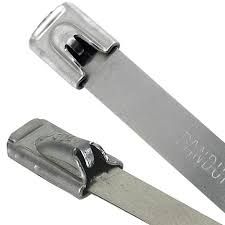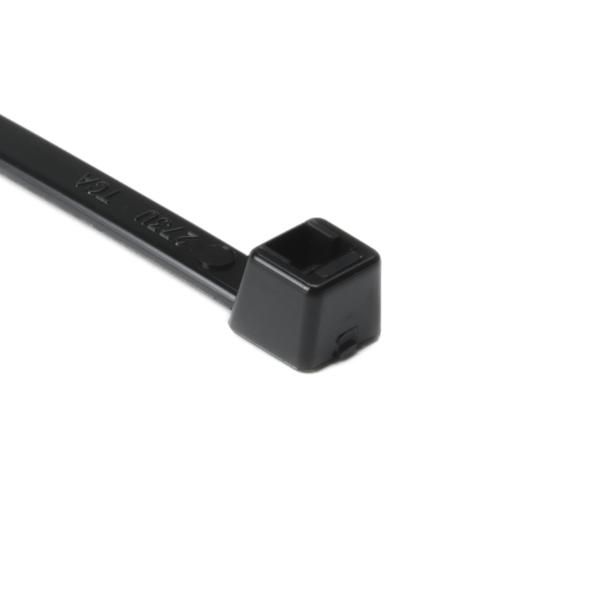Best Cable Ties for Marine Environments: Resistant to Saltwater and Harsh Conditions
Find out how to choose the best cable ties for marine environments. Learn why corrosion resistance and UV stability matter in saltwater conditions.
Cable ties, often referred to as zip ties, are crucial tools for securing, organizing, and managing cables in various industries. In marine environments, however, the demands are much higher. Saltwater, UV exposure, and physical stress are constant challenges that can cause standard cable ties to fail prematurely.
To ensure long-lasting performance and reliability, it’s essential to choose cable ties specifically designed for these harsh conditions.
Challenges of Marine Environments
Marine environments present unique conditions that can degrade standard materials. The primary challenges include:
Saltwater corrosion is one of the most significant threats. The salt content in the water accelerates material degradation, causing rust, brittleness, and eventual failure in non-resistant ties. UV exposure is another major concern. Prolonged exposure to the sun weakens many plastics, making them brittle and prone to breakage.
Constant humidity and moisture can weaken materials or promote mold growth, while physical stress from waves, wind, and vibrations exerts additional force on cable ties. Temperature fluctuations are also a factor, as rapid changes can cause materials to expand and contract, leading to cracks and reduced durability.
To combat these challenges, it is crucial to use cable ties designed to withstand the specific conditions of marine environments.
Top Cable Tie Options for Marine Environments
Stainless Steel Cable Ties

Stainless steel cable ties are a top choice for marine use. Made from 316-grade stainless steel, they are highly resistant to saltwater corrosion and UV exposure. They also provide exceptional tensile strength, making them ideal for securing heavy loads on boats, docks, and offshore installations. Stainless steel ties are non-conductive and can withstand extreme temperatures, ensuring reliable performance even in the harshest conditions.
Learn more: Red Polyester Coated 316 Stainless Steel Cable Ties: Quality and Uses
UV-Resistant Nylon Cable Ties

UV-resistant nylon cable ties are specifically designed to withstand intense sunlight without becoming brittle. Made from UV-stabilized nylon, these ties remain flexible and durable even after prolonged exposure to the sun. They also resist moisture and humidity, making them a versatile option for both outdoor and indoor marine applications. These cable ties are commonly used to secure wiring and cables on boats, docks, and marine equipment.
Learn more: What is UV Resistant Cable Tie Material?
Heavy-Duty Marine-Grade Cable Ties
 Heavy-duty cable ties are designed for applications requiring extra strength and durability. These ties are made from reinforced nylon or other high-performance polymers, offering superior tensile strength and resistance to saltwater and UV rays. They are commonly used for securing heavy equipment, rigging, and cables in marine environments. Their robust construction ensures long-term reliability under challenging conditions.
Heavy-duty cable ties are designed for applications requiring extra strength and durability. These ties are made from reinforced nylon or other high-performance polymers, offering superior tensile strength and resistance to saltwater and UV rays. They are commonly used for securing heavy equipment, rigging, and cables in marine environments. Their robust construction ensures long-term reliability under challenging conditions.
Learn more: Extra Heavy Duty Cable Ties: The Ultimate Solution for Secure Fastening
Nylon 612 Cable Ties
 Nylon 612 is a high-performance polymer that offers excellent resistance to saltwater, UV exposure, and chemicals. These ties are lightweight, flexible, and durable, making them ideal for harsh marine environments. Nylon 612 ties are often used for securing cables and wires on boats and in other outdoor settings where long-term reliability is essential.
Nylon 612 is a high-performance polymer that offers excellent resistance to saltwater, UV exposure, and chemicals. These ties are lightweight, flexible, and durable, making them ideal for harsh marine environments. Nylon 612 ties are often used for securing cables and wires on boats and in other outdoor settings where long-term reliability is essential.
Learn more: Here's How to Distinguish the Quality of Nylon Cable Ties
Features to Consider When Choosing Marine-Grade Cable Ties
Selecting the right cable ties for marine environments is crucial for ensuring long-term durability, safety, and performance. Harsh conditions like saltwater exposure, UV radiation, and constant physical stress require materials and designs that can withstand these challenges. Here are the key features to look for when choosing cable ties for marine use, with expanded details on why they matter:
Corrosion Resistance
Marine environments are highly corrosive due to the presence of saltwater, which accelerates the breakdown of many materials. To combat this, cable ties made from materials like 316-grade stainless steel and Nylon 12 are ideal. Stainless steel ties are particularly effective because they are not only resistant to rust but also maintain their strength and integrity even after prolonged exposure to salty air and water. Nylon 12, a high-performance polymer, offers similar resistance to corrosion while remaining lightweight and flexible.
UV Resistance
Prolonged exposure to sunlight can cause standard cable ties to degrade quickly. UV radiation weakens many plastics, making them brittle and prone to breakage over time. For marine applications, it’s essential to use UV-stabilized materials, such as UV-resistant nylon, that can endure extended sun exposure without compromising their strength or flexibility. This feature is especially important for outdoor installations like securing cables on boats, docks, or piers.
Tensile Strength
In marine environments, cable ties often need to secure heavy loads or withstand significant physical stress from waves, wind, or vibrations. High tensile strength is essential to ensure the ties can handle these forces without snapping. Look for cable ties rated for heavy-duty applications, which specify their tensile strength in pounds. For example, stainless steel ties are particularly well-suited for securing heavy equipment, while reinforced nylon ties are excellent for bundling cables and wires under stress.
Durability
Durability goes beyond material strength; it also includes the ability to withstand the combined effects of saltwater, humidity, UV radiation, and physical wear. Durable marine-grade cable ties are designed to maintain their performance even in the harshest conditions. Materials like reinforced nylon, Nylon 12, and stainless steel are engineered to resist abrasion, impact, and chemical exposure, ensuring long-lasting reliability.
Temperature Tolerance
Marine environments often experience rapid and extreme temperature fluctuations, from hot, sunny days to cool, damp nights. Cable ties must be able to endure these changes without cracking, warping, or losing strength. Materials like stainless steel and heat-resistant nylon perform well across a wide temperature range, ensuring consistent performance in climates that vary from tropical heat to freezing conditions. Heat-shrink cable ties also offer added protection by forming a secure, temperature-resistant seal when heated.
Additional Considerations
- Waterproofing: For applications where cables may be submerged or exposed to heavy moisture, heat-shrink cable ties provide an added layer of waterproofing.
- Flexibility: While strength is critical, flexibility is also important for securing cables around irregular surfaces or tight spaces. Nylon materials are particularly suitable for this purpose.
- Ease of Installation: Features like a curved tip or releasable mechanisms can make the installation process faster and more convenient, especially in challenging conditions.
Tips for Using Cable Ties in Marine Environments
Using cable ties effectively in marine conditions requires some best practices. Regular inspections are crucial to identify signs of wear, corrosion, or damage. Damaged ties should be replaced promptly to maintain the security of cables and equipment. Ensure that the ties are tightened securely but not over-tightened, as excessive force can cause premature failure.
For critical applications, consider combining cable ties with other fasteners, such as clamps or brackets, for added security. Finally, keep a supply of spare cable ties on hand to quickly replace any that fail due to harsh conditions.
Why Invest in High-Quality Marine-Grade Cable Ties?
Choosing the right cable ties for marine environments offers numerous benefits. High-quality ties have a longer lifespan, reducing the need for frequent replacements and minimizing downtime. They also enhance safety by securely bundling cables and equipment, preventing accidents caused by failing ties. Investing in durable, marine-grade ties ultimately saves money by ensuring reliable performance in demanding conditions.
Wrapping Up
Marine environments demand cable ties that can withstand saltwater, UV exposure, and constant physical stress. Stainless steel, UV-resistant nylon, heat-shrink, and heavy-duty marine-grade cable ties are all excellent options for these challenging conditions. By selecting the right cable ties and following best practices, you can ensure secure and long-lasting installations, whether on boats, docks, or offshore facilities.
For reliable performance and peace of mind, invest in high-quality marine-grade cable ties tailored to your specific needs. For more insights and tips on cable ties and other related products, explore cabletiesunlimited.com and follow us on our social media communities on Facebook and Instagram!
